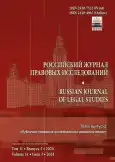Impact of International Law Fragmentation on the Development of Integration Processes
- Authors: Galushko D.V.1
-
Affiliations:
- Financial University under the Government of the Russian Federation
- Issue: Vol 11, No 3 (2024)
- Pages: 95-102
- Section: International law
- URL: https://journal-vniispk.ru/2410-7522/article/view/284817
- DOI: https://doi.org/10.17816/RJLS634737
- ID: 284817
Cite item
Abstract
This article analyzes the relationship between the phenomenon of fragmentation of international law and integration processes aimed the modern global transformations. Various approaches to understanding the fragmentation of international law are considered, including its causes, forms, and consequences. The article examines how fragmentation impacts the functioning of international integration entities, the development of interstate relations, and the effectiveness of international legal regulation. Particular emphasis is placed on the role of fragmentation as a conducive factor for the advancement of international integration and the establishment of specialized legal regimes within integration associations. Consequently, the degree of fragmentation in international law within established regions correlates with the level and depth of integration. In the current context, the fragmentation serves as a favorable element for participating states in fostering their integration interactions. In addition, international law functions as a crucial instrument for regulating these integration processes. The methodological foundation of this article comprises well-established general and specific methods of scientific research. The article’s purpose and objectives are to investigate the degree of influence and the nature of the interaction between the fragmentation of international law and modern international integration processes.
Full Text
##article.viewOnOriginalSite##About the authors
Dmitriy V. Galushko
Financial University under the Government of the Russian Federation
Author for correspondence.
Email: galushkodv@gmail.com
ORCID iD: 0000-0002-9301-9565
SPIN-code: 1710-5918
candidate of legal sciences, associate professor
Russian Federation, MoscowReferences
- Kirilenko VP, Alekseev GV, Vorotnikov AYu. Influence of the fragmentation of international law on the work of the United Nations. Eurasian Integration: Economics, Law, Politics. 2018;3(25):49–54. EDN: BCCPUM
- Beeson M. Regionalism and globalization in East Asia: politics, security, economic development. New York: Palgrave Macmillan; 2007.
- Wolf J. Regional arrangements and the UN Charter. In: Regional Cooperation, Organizations and Problems. 1983. Р. 289–295. doi: 10.1016/B978-0-444-86237-2.50084-6
- Davletgildeev RSh. To the question of approaches to the fragmentation of international law. Russian Juridical Journal. 2013;(3):20–25. EDN: QBZHUZ
- Iskevich IS, Suchkova EA. Classification of international legal norms. Problems of Contemporary Science and Practice. Vernadsky University. 2015;(2):109–112. EDN: TUWFDP doi: 10.17277/voprosy.2015.02.рр.109-112
- Stephens T. Fragmentation of international environmental law. In: International Courts and Environmental Protection. Cambridge Studies in International and Comparative Law. Cambridge: Cambridge University Press; 2009. P. 304–344.
- Tolstyh VL. International law as a metanarrative. Russian Juridical Journal. 2013;(3):8–14. EDN: QBZHUF
- Marschik A. Too much order? The impact of special secondary norms on the unity and efficacy of the international legal system. Eur J Int Law. 1998;9(1):212–239. doi: 10.1093/ejil/9.1.212
- Galushko DV, Yakovenko AV, Yaryshev SN. On the role of «soft law» in international legal regulation of the sphere of health care. IR Scientists’ Herald. 2023;(1):40–52. EDN: OKGRRY
- Kraevsky AA. Validity and efficacy of international law according to the pure theory of law. Bulletin of St. Petersburg University. Law. 2021;12(1):184–204. EDN: WPRIUT doi: 10.21638/spbu14.2021.113
- Lukashuk I.I. Globalization, state, law and the XXI century. Moscow: Spark; 2000. (In Russ.)
- Galushko DV. Interaction of European Union law with the law of Member States and third countries. Voronezh: VSU; 2018 (In Russ.) EDN: YZRQTR
- Mikhaliova TN. Methodology of regional integration. Proceedings of the National Academy of Sciences of Belarus, Humanitarian Series. 2018;63(3):366–376. EDN: YASECT doi: 10.29235/2524-2369-2018-63-3-366-376
- Alter KJ. The new terrain of international law: courts, politics, rights. Princeton: Princeton University Press; 2014. doi: 10.2307/j.ctt5hhs2t
- Ryzhov VB. Dialectics of globalization and regionalization in the legal space of the state and international organizations. International Law and International Organizations. 2020;(1):29–44. EDN: IHGUZK doi: 10.7256/2454-0633.2020.1.30979
- Göksan H. The global governance reflex of international judicial bodies. In: Catolica, 2014. Graduate legal research conference. Conference proceedings. September 19–20, Lisbon, Portugal. P. 117–173. doi: 10.2139/ssrn.2737191
- Komori T. Converging and diverging normative trends in the international community integrating the fragmented international public order: a theoretical perspective. In: Rieter E., de Weale H., editors. Evolving principles of international law: studies in honour of Karel C. Wellens. Leiden: Martinus Nijhoff; 2012. P. 103–135. doi: 10.1163/9789004216051_008
- Closa C, Casini L, Sender O. Comparative Regional Integration: Governance and Legal Models. Cambridge: Cambridge University Press; 2016.
- Bezborodov YuS. Universalization and localization of international legal regulation in conditions of globalization. Russian Juridical Journal. 2013;(3):26–30. EDN: QBZHVJ
Supplementary files







